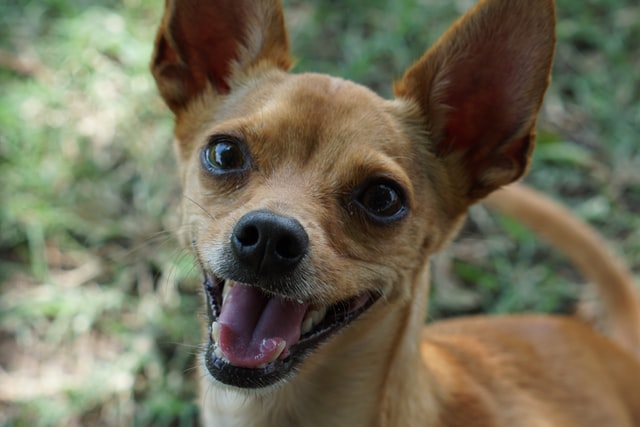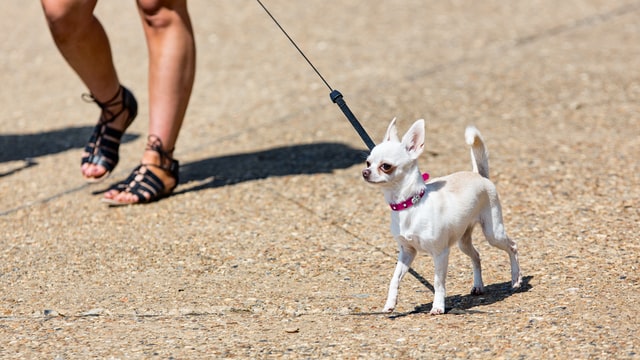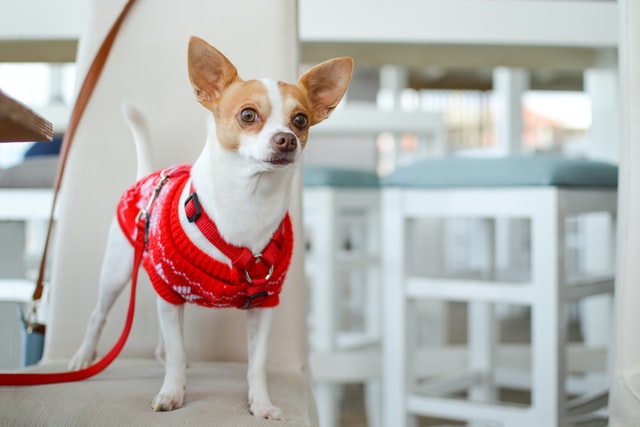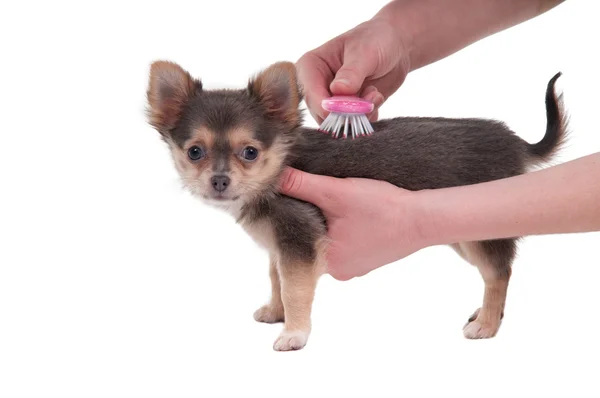If you have several pups in your home, then you must have already noticed that different pooches have different types of howls. As the time passes, this habit becomes more and more deep-rooted. It is so hard to stop them from howling. And this is one of the amplest pains in the neck when they start yelping at random times. This is especially true with howling Chihuahua.
If you’ve ever had a problem with a Chihuahua howling, then this article was written for you! There are several different approaches you can use to reduce undesirable or excessive howling behavior in your pet Chihuahua. So keep reading this article, and don’t forget to comment down your stories at the end of this blog.
HOWLING VS GROWLING
If you own a Chihuahua, you’re probably very familiar with the different sounds they make. Chihuahuas bark, whine, whimper, yip, and yelp. However, have you ever considered that your precious pup is capable of howling or growling? You might think these sounds are one and the same, especially if it’s been a while since you’ve heard either. But there are subtle differences between these audible signals.

Here’s what you need to know about howls and growls to ensure that you can respond quickly when the situation requires it.
🐕 Howling
Howling is a long, sustained vocalization that can range from high-pitched to low-pitched. Breeds that are wolf-type typically howl in response to being separated from their pack or when they feel threatened.
Howling is a form of communication. It’s how Chihuahuas keep in touch with each other, and it’s how they let the pack know they’re safe and sound. Howling is also used as an expression of joy or excitement. It communicates messages like “I’m here,” “Come here,” and “Hey, look at me!” This may be why many pet owners find howls so beautiful, and it’s music to their ears!
Chihuahuas also use howling as an expression of joy or sadness or just because it feels good. Howling might sound like your Chi is singing along to your favorite song, but it’s actually quite different: the pitch of its voice changes when it is singing versus howling!
🐕 Growling
Growling is a sign of dominance, but it can also be a warning or response to stress. If you hear your Chihuahua growl at someone else, it’s because they are issuing an order and telling that person to back off. If your Chi does this when you’re around, it may be acting nervous about something in the environment or possibly even checking for approval from you.
As with any behavior issue in dogs, there are many things that can contribute to growling as well as many different ways to address it. The first step is to determine why your Chi is growling and then figure out what type of training method would work best for him based on his personality and temperament.
IMPORTANCE OF DIFFERENTIATING HOWLING FROM GROWLING
The first step to comprehending your dog is to recognize the difference between howling and growling. Howling is a form of communication, whereas growling is also a way for dogs to communicate.
It’s important not to confuse howling with aggression. A lot of people think that when their Chi starts howling, they’re being aggressive or territorial because it sounds like they’re growling loudly at something in the distance, but this isn’t always the case! In fact, most often, when your pup starts howling, it’s actually just trying its best to get you all excited about something fun it saw outside.
Likewise, it’s important not to confuse growls with aggression, either. Growls are also ways for Chihuahuas to communicate. It’s just another way for them let us know exactly what they want from us at any given time!
CHIHUAHUA HOWLING BEHAVIOR
If you have a Chihuahua, you’ve probably heard their unique howl, which sounds like “hi!” or maybe more like a shriek. The howling is not confusing. It’s universal to all Chihuahuas and is one of the ways that they communicate with their owners. Howling Chihuahua do this to express themselves vocally and also to let their owners know when they need something.
This endearing behavior has actually been observed in so many Chihuahuas that doggie behavioral experts believe it’s innate in the breed. Howling can also be an expression of pain or discomfort in many cases. Check with your veterinarian if you think that your dog is howling in response to pain or pressure, as this could be a medical condition manifesting itself in behavioral changes.

🐕 Signal
Chihuahuas are innate howlers by nature. Chihuahuas howl to express themselves vocally but also to let their owners know when they need something.
A howling Chihuahua is a very common behavior in this breed of dog. It is an instinctual behavior for them, and it can be for many other breeds as well. However, it is not always painless to understand why your Chihuahua is howling or what it wants from you when it does so.
>>Attention seeking
When Chihuahuas feel lonely or ignored by their owner, they will try different tactics to get attention, such as barking, whining, and even silence (for example, if you have ever been on a long road trip with your best friend). If all else fails, then sometimes all we need is just a little bit more noise! This could mean that your little buddy feels like their needs aren’t being met while around other people or animals, so now would be an ideal time for some quality attention time together!
>>Hunger signal
Similar reasons apply here. Sometimes our furry friends get hungry too quickly after eating, which means there isn’t always enough time before meals come around again, so we have no choice but to continue making noise until someone gives us something delicious!
🐕 Anxiety
As mentioned, Chihuahuas are known to be very vocal dogs. They are known to howl when they want food, when other dogs are near or barking, and when people are leaving or entering the home.
It is significant to note that it is often a Chihuahua’s response to stress or anxiety-related situations. Suppose your Chi is howling, and this behavior has increased since bringing it home. In that case, there may be some underlying cause for concern that needs immediate attention, such as separation anxiety or behavioral issues with another pet in the household.
🐕 Sensitive to darkness
You can help your Chihuahua feel more comfortable and less anxious by being patient and gentle with it. Never shout or hit a Chihuahua, regardless of how much it may annoy you! When you arrive home, be sure to give it plenty of attention so that it knows that it is safe.
Never leave your Chihuahua outside alone at night or when it is dark. Chihuahuas are afraid of the dark and will often howl if left outside at this time of day. If there is a big noise outside, such as another dog barking or someone going in and out of their house, it can scare your Chihuahua too much, so do not leave them unattended near these noises either.
🐕 Pain and discomfort
If your Chihuahua is howling, it’s essential to know what’s normal for your pup. If you’ve observed that they typically don’t vocalize at all or only do so in specific situations, like when they want to go outside, then the fact that they’re suddenly howling could be an indication that there’s something wrong.
While if you think that your Chihuahua is howling because of pain or discomfort, check with your veterinarian immediately. A medical circumstances such as arthritis, hip dysplasia, or pain from dental disease can all manifest themselves in behavior changes like excessive barking and whining as well as increased irritability and aggression towards others.
UNDERSTANDING THE BEHAVIOR
It’s important to understand that your Chihuahua isn’t being bad. They are not trying to annoy you or get attention by howling. They are just expressing themselves and making sure that you know what they need so that you can provide it for them.
If your Chihuahua is howling, try and determine the cause of their distress. Is it because they are hungry? Do they need some exercise? Do they want some play time? If so, then give them what they want!
An excellent way to address these needs positively is by training them with clicker training. Clickers make training fun for both humans and Chihuahuas because there is an element of surprise involved when using one. Your Chi doesn’t know what will happen next! In addition to using a clicker during playtime or feeding times, always try and reward their behavior with treats after each successful interaction.
This will help reinforce positive associations between certain activities such as eating food or playing fetch with a toy which in turn allows us, humans, to better communication skills with our canine friends!
MANAGING CHIHUAHUA’S HOWLING
Chihuahua training takes a lot of time and commitment, so it is very important that you are persistent. Your Chi won’t learn anything if you don’t have time to train it properly. This section will discuss howling and some effective Chi training methods that may be helpful in controlling the behavior.

🐕 Beware of the cause of howling
There are several possible causes of howling, and each one requires its own treatment approach. For example, pain or injury can be the result of a fall or other injury. Infections can induce discomfort and inflammation in the throat region of your Chihuahua.
Allergies may cause your Chihuahua to scratch its face until it bleeds, which leads to infection and further scratching. Hormonal changes due to pregnancy may also cause excessive howling in some Chihuahuas though this is less common. Depression is another possibility. If you’ve lately lost a cherished family member or pet, your Chihuahua may be grieving as well!
🐕 Eliminate the reason for howling
If you’ve eliminated the reasons for howling, it’s time to eliminate the howling itself. At this point, your Chihuahua will be fully aware that it is being ignored and will continue to howl because it knows it gets a reaction from you. In order to control your Chihuahua from howling once and for all, you need to make sure that its needs are being met.
🐕 Teach him not to howl
As mentioned, howling is a natural behavior for Chihuahuas. It’s a form of communication that Chihuahuas use to communicate with other dogs, their pack, and their owners. When your Chihuahua howls, it’s important to remember that it isn’t doing so out of aggression or frustration. It is simply communicating in the way that nature intended it to do. Howling is an important part of a Chihuahua’s behavior and should never be discouraged or punished because it isn’t meant as a negative action on the pup’s part.
🐕 Train him with a focus command
A focus command is a word or phrase that you use to get your Chi’s attention. It should be something brief, simple, and easy to say that you can use in any situation.
Begin by introducing your Chihuahua to the “focus” command by saying it when it is not interested in anything else around it, for example when he is playing with another dog. When your Chihuahua stops what it was doing and looks up at you, praise it enthusiastically by saying “Good boy!” and give it a treat from your hand as soon as it looks at you. This will help them learn how to get treats.
Repeat this process until they understand what “focus” means without having too much trouble keeping their attention on one thing for any length of time.
🐕 Practice the focus command with distractions
The next time you are in the room with your Chi, try these variations of the focus command:
>>Practice with distractions at different distances.
Try standing in one place and asking your Chi to stay while you slowly walk around them. Then do it again, only this time have them sit still while you walk around them.
>>Practice with distractions at different volumes.
Do the same thing as above, but this time when kneeling down to speak to your Chi in a quiet voice but not whispering. Then, stand up straight and tell it to stay when it gets up on its hind legs or begins barking like crazy. If it is already sitting quietly before issuing this command then ask it first if it would like a treat before asking it to settle down into staying still for even just a few seconds!
This will help build confidence in both parties because eventually, it will understand that staying is far more enjoyable than running away from an object only one inch away from its nose or two feet away for larger dog breeds. If you don’t practice these situations often enough though… well let’s just say there won’t be any progress made towards getting along better together so make sure that every day is productive!
🐕 Make leaving/stay separate commands
To make sure that your Chihuahua can distinguish between the leave and stay commands, it’s important to make them clear and distinct. The best way to do this is with hand signals. When you want your Chihuahua to stay put, use a signal like pointing at it or giving a thumbs up. If you want it to follow you on command, then use a different gesture such as beckoning with your fingers or cupping one hand into the other and waving it in front of its face.
🐕 Patience
When training your Chihuahua, you should be persistent. If you want the desired results, then your efforts must be consistent and patient. It’s also important to reward your Chi whenever they perform as expected. This could be a small treat or verbal praise. Just remember not to overdo it! All these things will help them learn faster and make things easier for everyone involved.
Remember that howling may be a sign of being scared and to not mix the signals, the next section will tell you more about a scared Chihuahua.
OTHER SIGNS OF A SCARED CHIHUAHUA
A scared Chihuahua is a sad sight to see. The good news is that many times there are tell-tale signs of their fear, so you can offer some comfort and get them back to their normal happy self.
🐕 Barking
Barking is a way for your Chihuahua to communicate with you, other humans and other animals. It’s not unusual for your Chi to bark at the sight of something new or unfamiliar, and it’s important that you don’t punish them when they do so. Punishing a Chihuahua for barking can cause them to become more fearful over time and may make them choose to remain silent in situations where they should be communicating what they need or want out loud.
🐕 Hiding
Hiding is a sign of fear and also a natural instinct for Chihuahua. If you notice your Chi hiding, it might be because it’s scared of something or someone in the house. It could also be that it’s feeling stressed from new surroundings, such as moving into a new home. If your Chi has been hiding more than normal lately, try to figure out why and help him feel less stressed.
🐕 Shivering/trembling
It is important to note that shivering and trembling are two different things. Shivering is a sign of cold, but trembling can be a sign of many things including fear or excitement.
If your Chi is shivering, it may be because it is feeling scared or nervous about something. This could mean that they are afraid of being out in public places like restaurants or stores, or perhaps they’re just anxious about meeting new people and strange situations.
🐕 Pacing/walking in circles
Pacing, or walking in circles, is a behavior that can indicate anxiety. Your Chihuahua might pace when they’re feeling scared or stressed. If your Chi is pacing, it’s important to determine what areas of the house are making them anxious so you can address those issues.
If your Chihuahua has been recently vaccinated for rabies and the vaccine is about to kick in, then this could be the cause of their pacing. Chihuahuas tend to be more sensitive than other breeds as far as vaccinations go, so if yours gets scared after being vaccinated, then they may start pacing around for a few hours afterward.
Another reason why your Chihuahua may start pacing after being vaccinated is that they’re missing their pack members who were also recently vaccinated. If this happens frequently enough then it might be time to get another dog!
🐕 Stiff posture
When a Chi is scared, it stands very stiffly, with its tail held straight out behind it. This is called “tail tucking.” It may also cower. This posture is similar to the one adopted by a dog who is aggressive, but there are differences in the way that each of these postures looks.
If you have ever seen a Chihuahua who was afraid but didn’t know what to do about it, you’ll recognize this as “the frightened puppy” stance. It can be very cute when your little Chi pup gets scared and puts his ears back while shrinking into itself and looking up at you with big eyes that say “please don’t hurt me,” but not so cute when your Chi does it after being startled by a loud noise or something else unexpected.
When Chihuahuas are frightened for any reason, whether because they’re dealing with an immediate danger or because something has happened that scares them on occasion, they will naturally try to protect themselves by standing still and looking small instead of moving around quickly. This might bring them closer to an attacker.
🐕 Tucking tail between legs
Tucking the tail between legs is a sign of being scared or feeling vulnerable. This can be a sign of submission, such as when a Chihuahua feels threatened and tucks its tail to look smaller, but it’s also common for Chihuahuas that feel scared or uncomfortable to curl up with the tail between their legs. In this case, they aren’t actually trying to protect themselves by making themselves smaller. They’re just trying to comfort themselves by seeking warmth in a familiar position.
This isn’t always a bad thing! For example, if you’ve ever seen a Chihuahua who has been outside in cold weather and then comes inside where it’s warm, you might notice them curling up into this position right away because they feel suddenly relaxed after being outside and exposed to the elements. In other words: scared. A tail tucked between legs does not always indicate fear. Sometimes it indicates something else entirely!
🐕 Avoiding eye contact
As you are interacting with your Chihuahua, it may avoid eye contact. If your Chi is comfortable with you and doesn’t feel threatened, it will make eye contact. However, if your Chi is scared or nervous about something, it may look away from you or even shut his eyes. This can be a sign that it’s feeling uncomfortable or uncertain about the situation at hand. It can also be a sign that it’s being scolded by someone else like another family member or even another dog in the household who’s been trained to correct it for bad behavior. This is especially common among puppies.
🐕 Laying down on the floor or ground
Laying down on the floor or ground is one of the most common signs that your Chihuahua is afraid. When a Chi lays down in order to show submission, they are telling you that they are not a threat or an enemy. If you’re trying to pick up your frightened Chihuahua off of the floor and he refuses to get up, this could be another sign that he’s scared.
🐕 Sleeping with their back turned toward you
Laying down in general can mean many different things for some Chihuahuas, depending on the context and situation. But fear can definitely play a large role here! It’s important to be aware of what type of behavior this is before assuming it means something else entirely!
Other Chihuahuas display fear by sleeping with their back down too. If we think about our own reactions when we’re scared or nervous about something happening around us, we might find ourselves feeling more comfortable sitting or lying down than standing upright. This is why dogs do the same thing!
And if your Chihuahua sleeps under the covers, check this article out by clicking here!
BOTTOM LINE
The Chihuahua is not known for its quiet disposition and one of the most common complaints that owners have is their dog’s howling. The noise can be very embarrassing to some people and it is different than any noise a dog makes. There are legitimate reasons why Chihuahuas howl, as well as solutions to stopping the unwanted, annoying behavior.
By utilizing all the techniques listed in this article, I hope that you can already have a peaceful day!
Here at ILoveChihuahua, we share our personal experiences as owners of this feisty breed. We talk about recommended methods, dog supplies picks, and advice on common Chihuahua problems. Our goal is to promote responsible dog ownership, so there would be fewer Chihuahuas in shelters.


